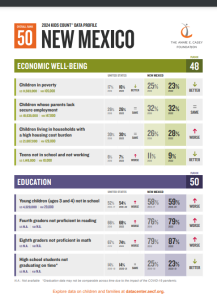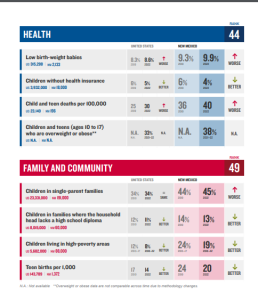OPINION: We cannot blame lack of funding for being last again in Kids Count rankings

The latest edition of Kids Count provides more devastating news about New Mexico and the condition of our children. The report, created by the Annie E. Casey Foundation (a center/left non-profit that works nationwide) analyzes and ranks all 50 states based on 16 variables relating to childhood outcomes.
Surprising absolutely no one, New Mexico again was at the very bottom at 50th overall. I analyzed the report and counted 7 variables that improved, 7 that got worse, and 2 that stayed the same relative to last year’s report. Based on this it is hard to point to any trend line pointing towards improvement.
That’s a problem for New Mexico’s left-wing politicians like Gov. Lujan Grisham, a majority in our Legislature, and the vast network of organizations that reflexively support big government schemes as the path to improving conditions for New Mexico kids.
For decades New Mexico has struggled to provide good outcomes for children. For decades we were told that New Mexico is a “poor” state and that if only we poured more money into government pre-K, K-12, and numerous other taxpayer-funded programs that improvement would come.
But, for the last decade the money to improve New Mexico has been available thanks to record-setting growth in oil and gas production. Despite massive spending growth in education and the creation of taxpayer-funded universal pre-K, our kids still face the worst outcomes nationwide.
If you cannot blame a lack of funding or failure of government programs to “move the needle” for our kids, what do you do instead? If you are New Mexico Voices for Children you blame “racist” standardized tests! In response to New Mexico’s poor performance on Kids Count, the organization wrote,
“New Mexico’s ranking in the education domain is heavily impacted by national standardized test scores, including fourth grade reading proficiency,” said Emily Wildau, KIDS COUNT Coordinator at New Mexico Voices for Children. “Reading proficiency is critical for students to succeed academically and as adults. These scores do not reflect the ability of our children, but rather an education system that is not designed with our multicultural, multilingual students in mind.”
Set aside the fact that standardized tests only account for two of the 16 variables contained in the Kids Count report. Also set aside that numerous other states with large minority populations outperform New Mexico (Texas and Maryland are two) or (like Mississippi) are showing dramatic improvement on Kids Count and other education performance indicators.
It isn’t just our education system that has failed to “move the needle” on difficult challenges facing New Mexico children. A December 2023 Legislative Finance Committee report found that “In FY23, New Mexico spent over $10.1 billion of state and federal funds on income support programs – $2.6 billion more than in FY19. Over the same time, poverty levels have remained stubbornly high with poverty rates staying around 18 percent.”
Rather than pursuing the failed government-driven model of more spending and more programs, New Mexico needs to change direction. Adopting educational choice costs nothing while empowering families to make the education decisions that work best for them. And, of course, with the massive budget surpluses available to them the Legislature and Gov. could and should embrace tax reforms and other policies that would diversify New Mexico’s economy and get more people involved in the best anti-poverty program we know of, a job.
Paul Gessing is president of New Mexico’s Rio Grande Foundation. The Rio Grande Foundation is an independent, nonpartisan, tax-exempt research and educational organization dedicated to promoting prosperity for New Mexico based on principles of limited government, economic freedom and individual responsibility


